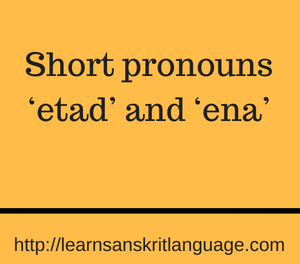You must be thinking that what has adjective to do with pronouns. Well, you should know that they are not normal adjectives, they are pronominal adjectives. Now, what makes them different from normal adjectives? The answer is that these adjectives have a similar ending as of pronouns. Hence they are called pronominal noun where “pronominal” means “connected to the pronoun” So let’s take a look at some of the example.
| अन्य anya | mfn | Other, another |
|---|---|---|
| उभ ubha | mfn | Both |
| एक eka | mfn | one |
| पर para | mfn | Above, beyond |
| पूर्व pūrva | mfn | Former, previous |
| सर्व sarva | mfn | All |
| स्व sva | mfn | Own |
How to Use Them
All the above words that we have learned have one thing in common i.e. They all have used pronoun endings, however, it is not same in case 1 and 2 neuter singulars. For all pronouns but “anya”, case 1 and case 2 will behave like the neuter -a noun, not like the neuter tad.
अन्यत्
anyat
Other (neuter singular, cases 1 and 2)
एकम्, परम्, सर्वम्, पूर्वम्, स्वम्
ekam, param, sarvam, pūrvam, svam
Both, one, above, former, all, own (neuter singular, cases 1 and 2)




